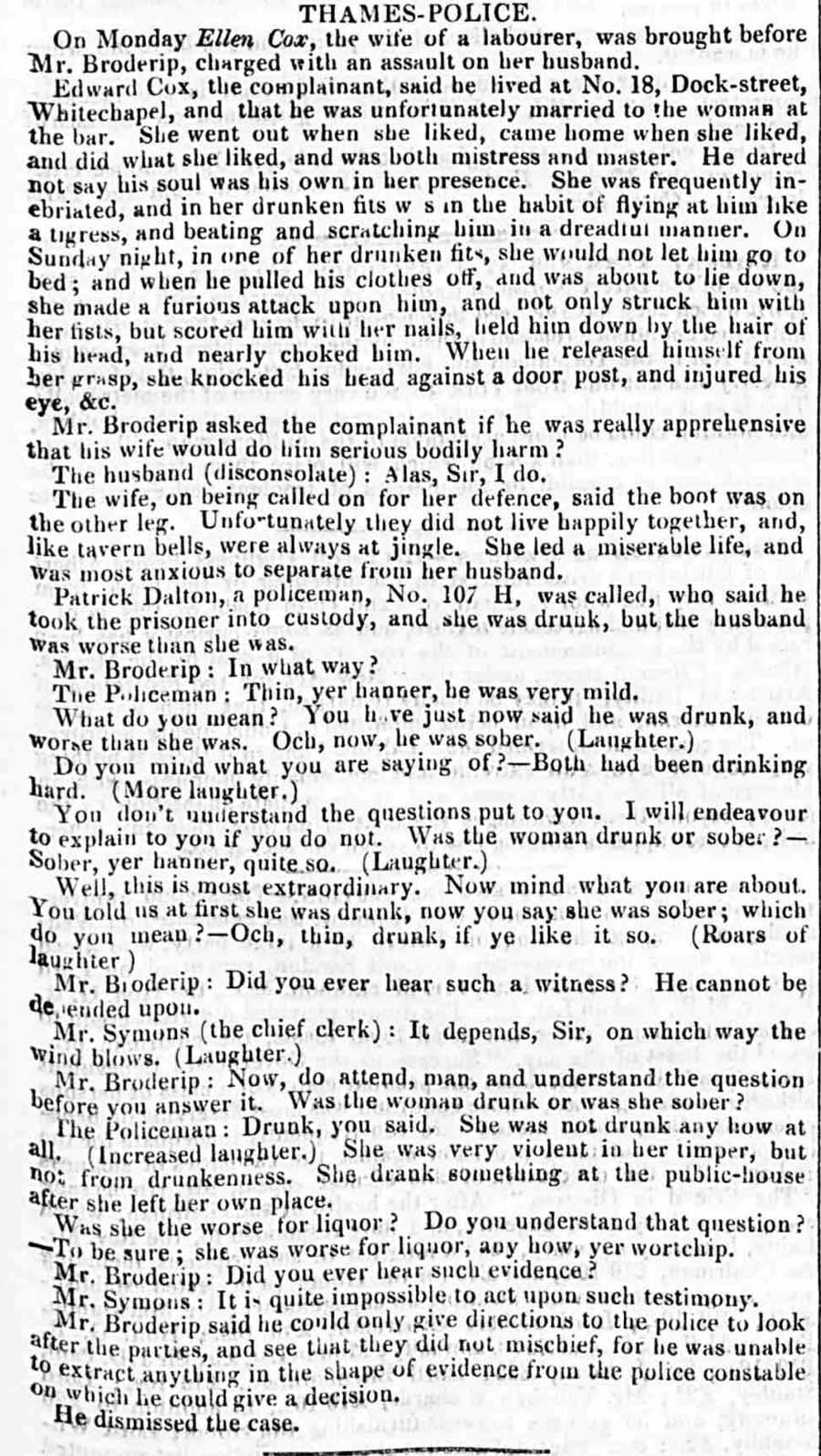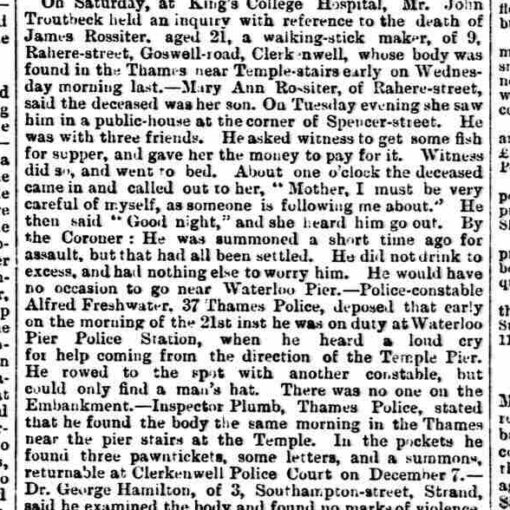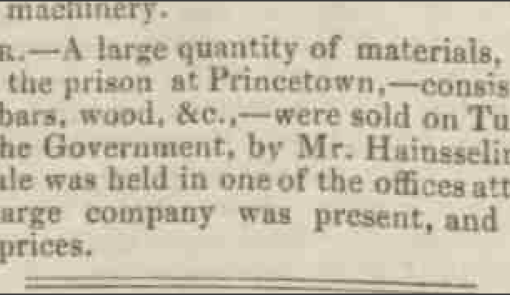Table of Contents
ToggleAge (London) – Saturday 19 April 1845

On Monday Ellen Cox, the wife of a labourer, was brought before Mr. Broderip, charged with an assault on her husband.
Edward Cox, the complainant, said he lived at No. 18, Dock-street, Whitechapel, and that he was unfortunately married to the woman at the bar. She went out when she liked, came home when she liked, and did what she liked, and was both mistress and master. He dared not say his soul was his own in her presence. She was frequently inebriated, and in her drunken fits was in the habit of flying at him like a tigress, and beating and scratching him in a dreadful manner. On Sunday night, in one of her drunken fits, she would not let him go to bed; and when he pulled his clothes off, and was about to lie down, she made a furious attack upon him, and not only struck him with her fists, but scored him with her nails, held him down by the hair of his head, and nearly choked him. When he released himself from her grasp, she knocked his head against a door post, and injured his eye, &c.
Mr. Broderip asked the complainant if he was really apprehensive that his wife would do him serious bodily harm?
The husband (disconsolate): Alas, Sir, I do.
The wife, on being called on for her defence, said the boot was on the other leg. Unfortunately, they did not live happily together, and, like tavern bells, were always at jingle. She led a miserable life, and was most anxious to separate from her husband.
Patrick Dalton, a policeman, No. 107 H, was called, who said he took the prisoner into custody, and she was drunk, but the husband was worse than she was.
Mr. Broderip: In what way?
The Policeman: Thin, yer hanner, he was very mild.
What do you mean? You have just now said he was drunk, and worse than she was.
Och, now, he was sober. (Laughter.)
Do you mind what you are saying of?—Both had been drinking hard. (More laughter.)
You don’t understand the questions put to you. I will endeavour to explain to you if you do not. Was the woman drunk or sober?
Sober, yer hanner, quite so. (Laughter.)
Well, this is most extraordinary. Now mind what you are about. You told us at first she was drunk, now you say she was sober; which do you mean?
Och, thin, drunk, if ye like it so. (Roars of laughter.)
Mr. Broderip: Did you ever hear such a witness? He cannot be depended upon.
Mr. Symons (the chief clerk): It depends, Sir, on which way the wind blows. (Laughter.)
Mr. Broderip: Now, do attend, man, and understand the question before you answer it. Was the woman drunk or was she sober?
The Policeman: Drunk, you said. She was not drunk any how at all. (Increased laughter.) She was very violent in her temper, but no, from drunkenness. She drank something at the public-house after she left her own place.
Was she the worse for liquor? Do you understand that question?
To be sure; she was worse for liquor, any how, yer worship.
Mr. Broderip: Did you ever hear such evidence?
Mr. Symons: It is quite impossible to act upon such testimony.
Mr. Broderip said he could only give directions to the police to look after the parties, and see that they did not mischief, for he was unable to extract anything in the shape of evidence from the police constable on which he could give a decision.
He dismissed the case.
Analysis and Explanation
This article, published in The Age on 19 April 1845, is a fascinating insight into domestic life, societal attitudes, and judicial proceedings in London during the 1840s. It captures a moment of public spectacle in a courtroom, blending serious domestic issues with humorous absurdity.
- Domestic Conflict in 19th-Century London:
The case depicts a tumultuous marriage, highlighting issues of domestic abuse and alcohol misuse. Both Edward Cox and Ellen Cox are portrayed as trapped in a toxic relationship characterised by violence and misery. Edward claims to be a victim of his wife’s drunken rage, while Ellen counters that their mutual unhappiness has made life unbearable. - Role of Gender and Authority:
The dynamics reflect the rigid gender roles of the time. Edward’s complaint portrays him as emasculated, as his wife assumes the role of “mistress and master,” defying societal expectations of submissive femininity. The tone suggests a mix of sympathy and ridicule for a man perceived as overpowered by his wife. - Alcohol and Its Social Implications:
The repeated references to drunkenness underline the prevalence of alcohol in working-class life. The blurred line between violence due to drunkenness and inherent temper issues suggests a social tolerance for drinking that often complicated legal proceedings. - Courtroom Procedures and Humour:
The article paints the courtroom as both a place of justice and a stage for public amusement. The policeman’s contradictory testimony becomes a focal point of humour, with the magistrate and clerk openly mocking his inability to provide clear answers. This reflects a broader trend of 19th-century court reports mixing serious social commentary with entertainment for readers. - Life in London in the 1840s:
- The setting in Whitechapel hints at the struggles of the working class in one of London’s poorer districts. Domestic violence, alcohol abuse, and marital discord were common in such environments, shaped by poverty and societal pressures.
- The justice system appears informal by modern standards, with magistrates improvising in the face of chaotic evidence.
- Historical Value for Historians:
Articles like this are invaluable for understanding the lived experiences of ordinary people in Victorian London. They reveal:- The everyday challenges of working-class life.
- Social attitudes toward gender roles, alcohol, and marriage.
- The functioning (or dysfunction) of the legal system.
For historians, this piece offers a microcosm of Victorian life, combining humour and tragedy to provide a vivid snapshot of the era’s social fabric. It also raises questions about how justice was perceived and administered in cases involving complex social issues.
A chaotic courtroom scene reveals the struggles of Victorian London: drunken fights, domestic strife, and a baffled magistrate. #VictorianLondon #History #SocialHistory #Whitechapel #CourtroomDrama




